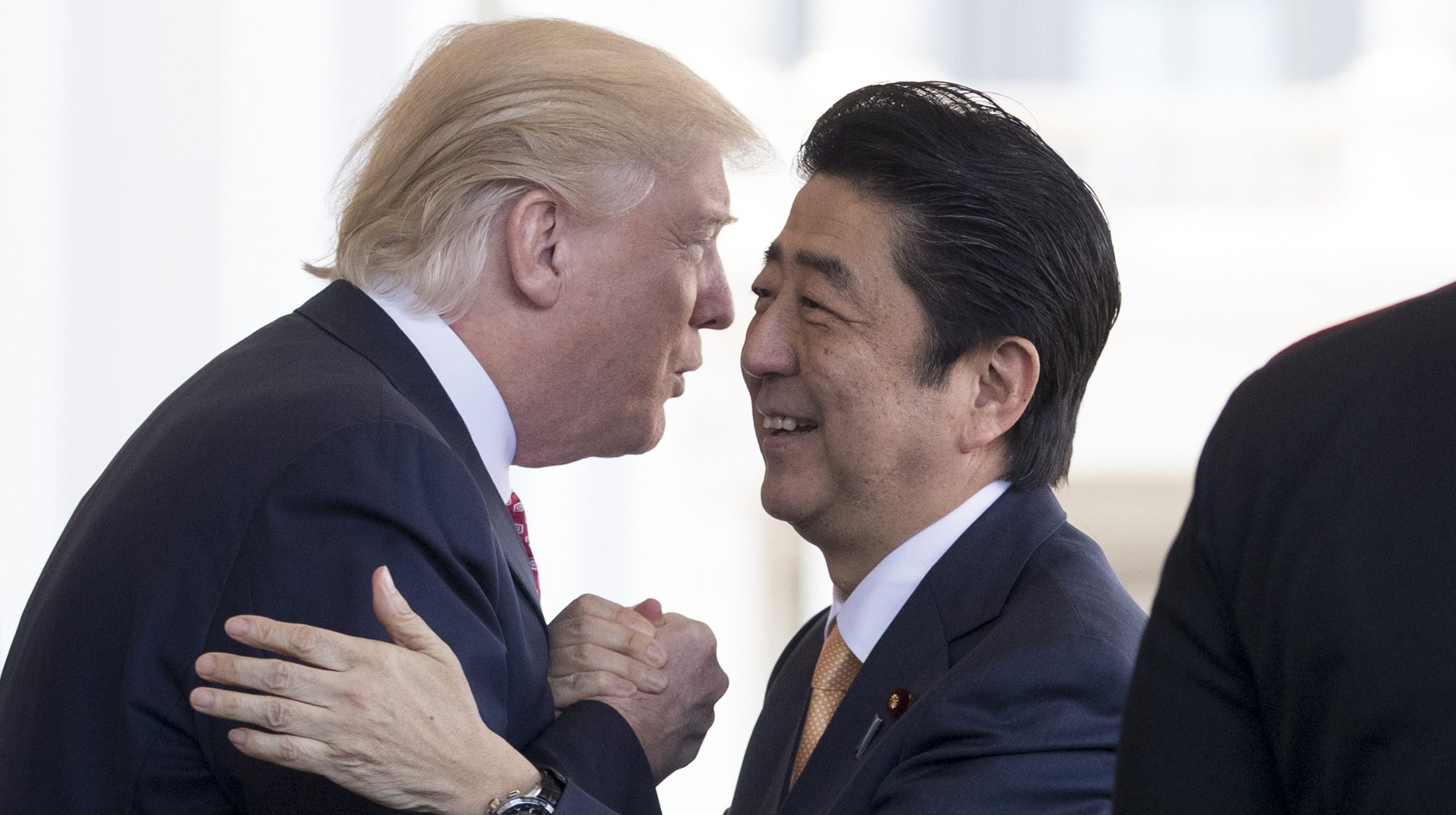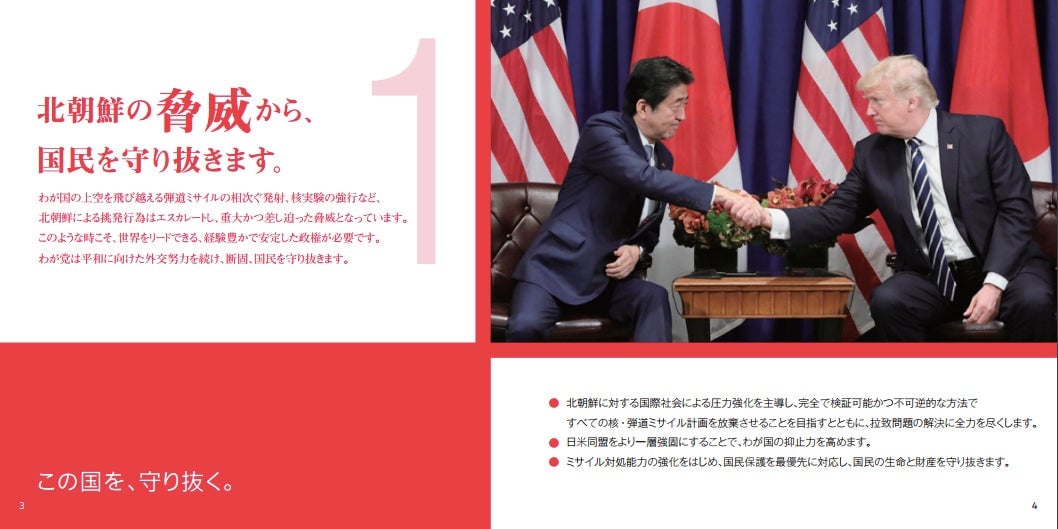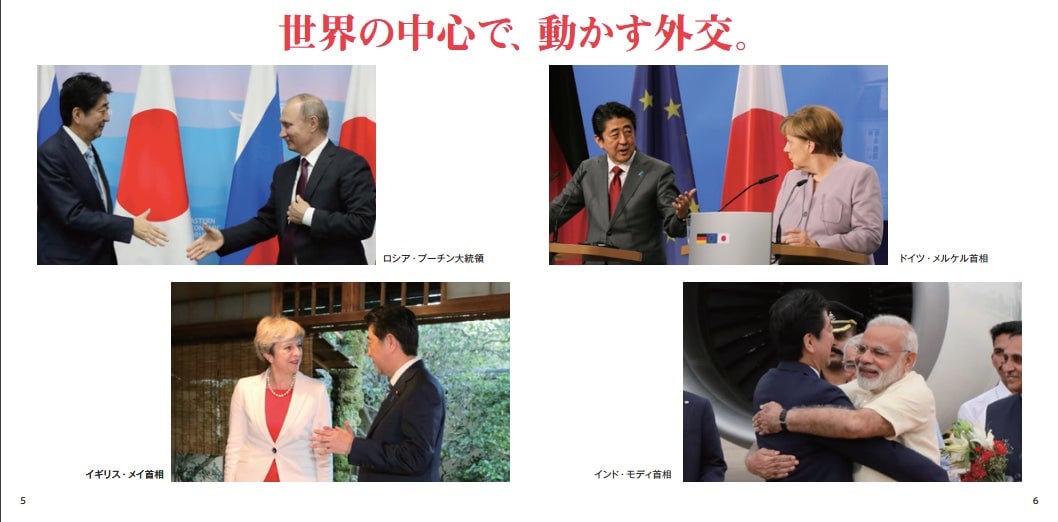Japan’s leader is telling voters his bromance with Trump can help protect them from North Korea
Shinzo Abe has been described as Donald Trump’s “phone buddy” (paywall) and “loyal sidekick” (paywall).


Shinzo Abe has been described as Donald Trump’s “phone buddy” (paywall) and “loyal sidekick” (paywall).
Few world leaders can claim to have such a close relationship with the US president, so the Japanese prime minister is now banking on their relationship to convince voters that he’s the one to lead them in an increasingly dangerous world.
Abe wants Japanese voters to put one thing front and center when they go to the ballot box on Oct. 22—North Korea. Though his decision to call a snap election is an unpopular one, Abe has warned that the country is in a “national crisis,” and that because regional geopolitical tensions will only become more intense, it wasn’t possible to wait and call an election next year.
It’s little surprise, then, that in its election pamphlet (link in Japanese, pdf), Abe’s Liberal Democratic Party (LDP) places North Korea at the top of its agenda. As missiles fly over Japan, Abe vows to “protect this country to the very end” and to “strengthen the US-Japan alliance” against Pyongyang’s threats.

Being tough on North Korea has helped buoy support for Abe even in a year of scandal for him and his government. Understanding that only its alliance with the US can truly keep Japan safe—as part of its post-World War II atonement it forsook war and relies on US forces to protect against external threats—Abe has shown unwavering support for Trump’s tough talk against Pyongyang. And the fear of North Korea in Japan is about as visceral as it gets—in addition to threats of being obliterated into non-existence, the Japanese public still remembers the abduction of over a dozen citizens to North Korea by the regime. The prime minister has repeatedly vowed to resolve the issue, including at a recent speech to the United Nations general assembly.
A survey this week showed that nearly 40% of LDP candidates standing in the lower house elections this month support military action led by the US against North Korea if the issue cannot be resolved peacefully.
Another page boasts of Abe’s “active diplomacy” all around the world, featuring Abe with world leaders including Russia’s Vladimir Putin and India’s Narendra Modi. Abe has enjoyed a particularly bromantic relationship with the latter of late, and has also been embracing Putin (paywall) in the hopes that he can make progress in Japan’s decades-long territorial dispute with Russia over a chain of islands. All in all, according to a promotional video (link in Japanese) by the LDP, Abe has visited 42 countries and attended 191 meetings with heads of states since he came to power in 2012.

Other issues get shorter shrift in the LDP’s manifesto, such as the economy, post-quake reconstruction, and childcare, in part, as the party asserts, because the prime minister’s “Abenomics” blueprint for reform is bearing fruit.
Japan’s left-leaning opposition, however, have criticized Abe’s calling of a snap election, and accuse him of hyping the North Korea issue as a way to distract voters from the multiple scandals that have plagued his government this year.
Shortly after Abe called the election, many pinned their hopes on popular Tokyo governor Yuriko Koike’s newly formed party to potentially disrupt the LDP’s long-held grip on Japanese politics. But excitement over her party is starting to wane, as voters wake up to the fact that policies advocated by the right-leaning Koike look increasing hard to discern from Abe’s.
Polls show that many voters are still undecided, while the left-leaning opposition has been temporarily energized by the formation of yet another new party, but Abe looks set to retain at least a simple majority in the lower house. A poll on Sep. 30 by the Yomiuri newspaper also found that 64% (link in Japanese) of respondents considered “North Korea and other foreign policy and security issues” as the most important issue in the election, the highest among all options.
Voters may not be anywhere near agreement on Abe himself, but many seem at least ready to admit that North Korea really scares them.